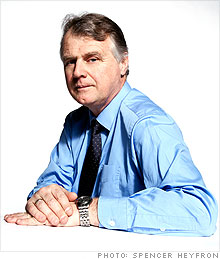FORTUNE -- It is a truth universally acknowledged that when natural calamities or geopolitical shocks happen, markets go into a tizzy and everyone rushes for safe havens. Then braver souls pour scorn on the wusses who are heading for the exits and buy on the dip, insisting that historic events such as 9/11 and Hurricane Katrina are barely noticeable in the grand progress of economic history.
Who's right? Not a third of the way through 2011, we're dealing with three enormous stories: the Arab Spring, the aftermath of the earthquake and tsunami in Japan, and Europe's deepening debt crisis. Let's look at the economic impact of each in turn.

Though the price of Brent crude oil dipped a little in mid-March, it's still around a two-year high. Many take that as evidence that turmoil in the Middle East is going to hurt the global recovery, but I remain skeptical. I wouldn't dismiss the war in Libya as a "sideshow," as one analyst I trust does, but with about 2% of the world's proven oil reserves, Libya just isn't that big a deal in energy markets. Real unrest in Saudi Arabia would change my view, but so far the Saudis have shown themselves determined to keep a lid on protests.
The tragedy in Japan is another matter. It may knock around 0.5% off Japan's growth in the first half of this year, which was never looking that robust. Tepco, the utility company that ran the doomed Fukushima Daiichi nuclear plant, will have to spend billions of dollars in cleanup and decommissioning costs, and billions more to compensate those who have lost jobs and homes. (The government has denied that it plans to take over the company, but Tepco's stock is in free fall.) Japan bulls will tell you that rebuilding infrastructure in the northeast will boost the economy in time, but that is truly a case of looking for a pony in a heap of manure and about as edifying.
Over time, the main consequence of the earthquake will be felt in energy markets. Outside command-and-control economies such as China, the supposed "renaissance" in nuclear power just got tossed back into the Dark Ages. (Nuclear worries played a key part in the devastating defeat of Angela Merkel's Christian Democrats in the German state of Baden-Württemberg on March 27.) Good for gas and coal; not good for tackling climate change.
Europe's debt and banking crises -- they're different, though linked -- aren't as dramatic as Japan and the Middle East, but the news there is not great either. Portugal's borrowing costs are soaring, and its budget deficit last year came in at 8.6% of GDP against a target of 7.3%. Ireland's scarcely believable banking crisis deepened, with the government saying on March 31 that the banks needed another $34 billion of capital, bringing the total cost of the meltdown so far to nearly $100 billion -- in a nation of just 4.4 million people.
But it's important to keep all this in perspective. The combined size of the economies of Portugal, Greece, and Ireland is about that of Florida's -- not trivial, but not huge. And slowly, something like a eurozone-wide system of economic governance is being put in place, with both emergency financing mechanisms and commitments to tough, German-style discipline on public finance. That may force the peripheral European economies to live within their means and increase competitiveness.
In the long term, I'm hopeful that the earthquake may be the shock to the Japanese establishment that it so desperately needed, ending -- among other things -- the protection of hopelessly managed companies like Tepco. In like manner, the Arab Spring may one day be seen as the beginning of the end for crony capitalism in the Middle East. Meanwhile, as crocuses blossomed, the U.S. jobs report for March revealed strong growth in private sector employment.
Where does that leave us? The global recovery may be slow, unsteady, and uncertain, and has surely not been helped in the short term by the three crises. But look, it has been a long winter. I'm surely allowed to think that while recovery has been delayed, it has not been derailed. ![]()



| Overnight Avg Rate | Latest | Change | Last Week |
|---|---|---|---|
| 30 yr fixed | 3.80% | 3.88% | |
| 15 yr fixed | 3.20% | 3.23% | |
| 5/1 ARM | 3.84% | 3.88% | |
| 30 yr refi | 3.82% | 3.93% | |
| 15 yr refi | 3.20% | 3.23% |
Today's featured rates:



| Company | Price | Change | % Change |
|---|---|---|---|
| Ford Motor Co | 8.29 | 0.05 | 0.61% |
| Advanced Micro Devic... | 54.59 | 0.70 | 1.30% |
| Cisco Systems Inc | 47.49 | -2.44 | -4.89% |
| General Electric Co | 13.00 | -0.16 | -1.22% |
| Kraft Heinz Co | 27.84 | -2.20 | -7.32% |
| Index | Last | Change | % Change |
|---|---|---|---|
| Dow | 32,627.97 | -234.33 | -0.71% |
| Nasdaq | 13,215.24 | 99.07 | 0.76% |
| S&P 500 | 3,913.10 | -2.36 | -0.06% |
| Treasuries | 1.73 | 0.00 | 0.12% |
|
Bankrupt toy retailer tells bankruptcy court it is looking at possibly reviving the Toys 'R' Us and Babies 'R' Us brands. More |
Land O'Lakes CEO Beth Ford charts her career path, from her first job to becoming the first openly gay CEO at a Fortune 500 company in an interview with CNN's Boss Files. More |
Honda and General Motors are creating a new generation of fully autonomous vehicles. More |
In 1998, Ntsiki Biyela won a scholarship to study wine making. Now she's about to launch her own brand. More |
Whether you hedge inflation or look for a return that outpaces inflation, here's how to prepare. More |